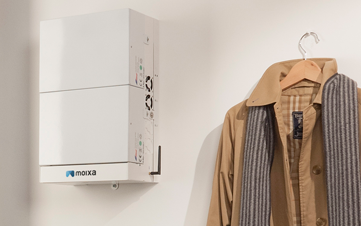UK firm Moixa is once again testing the benefits of batteries for homeowners and utilities in making use of renewable energy.
The residential energy storage firm, along with utility Northern Powergrid (NP) and community renewable energy group Energise Barnsley teamed up to demonstrate how batteries can utilise solar energy.
The 2-3kW/h units use cells sourced from two unnamed Chinese companies.
The residential energy storage systems will allow homeowners to use more of the renewable energy it generates, rather than feeding it onto the grid.
If successful, NP believes such ESSs could reduce the need for UK network operators to upgrade infrastructure to cope with load-shifting at peak generation times.
Installation of the first batteries, funded by NP in Oxspring, near Barnsley, will be at the end of January. The trial will include 30 homes with solar PV panels and 10 without.
Moixa’s lithium-ion phosphate Smart Batteries will be linked in a virtual power plant to study how it can reduce peak solar output onto the electricity networks during low local demand.
This is the second trial of its kind Moixa is involved with. It began trials last October in London to demonstrate the benefits of energy storage linked to renewable sources.
Simon Daniel, CEO of Moixa, said: “Batteries will allow the electricity system to support much higher levels of low-carbon renewable power and increase UK energy independence.
“By managing clusters of home batteries in a virtual power plant we believe we can significantly reduce peak solar generation output onto the network.”
Andrew Spencer, System Planning Manager for Northern Powergrid, said: “This innovative project will provide valuable data on how the inclusion of batteries in solar schemes can enable our designers to connect more PV panels before further network reinforcement is required.”
Its software includes ‘learning algorithms’ which respond to solar generation, electricity network needs and each user’s behaviour to maximise the benefits of storage.












